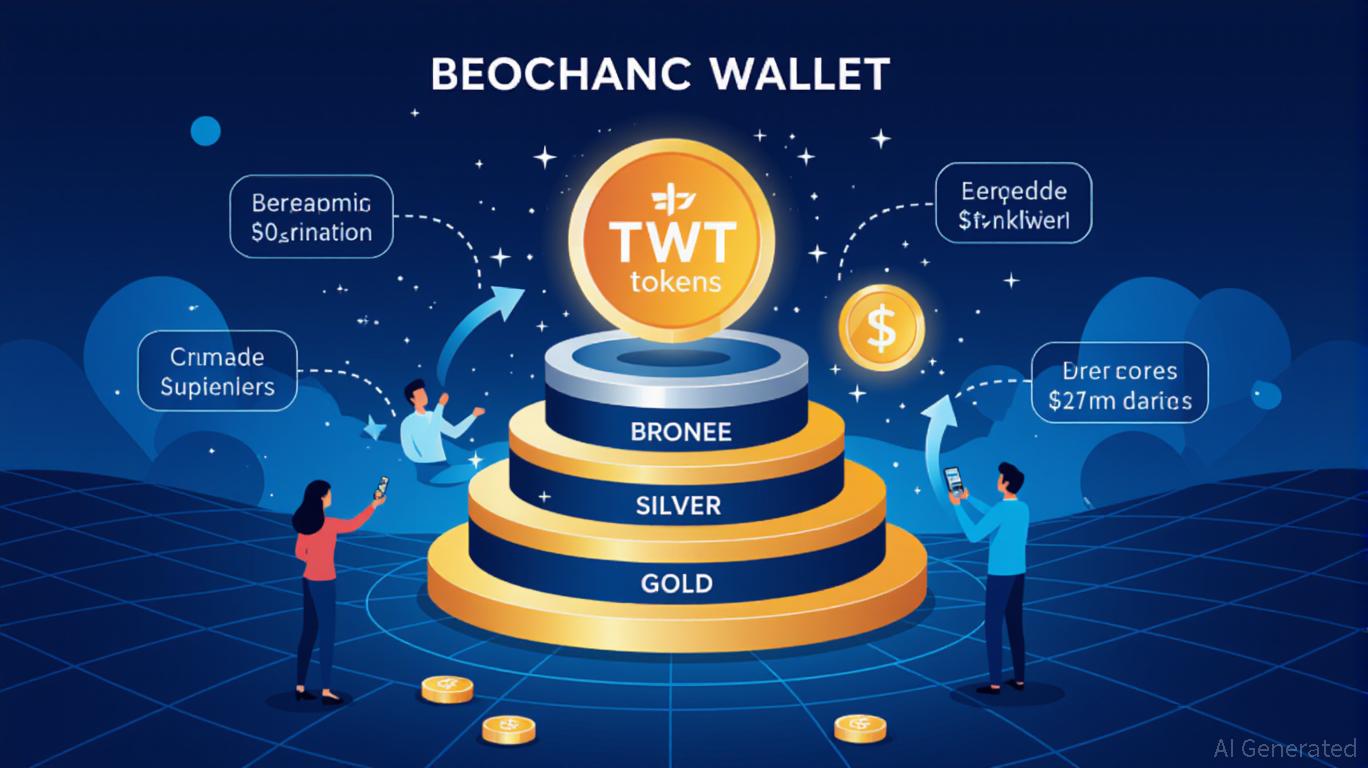TWT Introduces a Revamped Tokenomics Framework: Transforming DeFi Rewards and Influencing User Actions
- Trust Wallet's TWT tokenomics shift to utility-driven incentives via Trust Premium, replacing speculative governance with tiered rewards for user engagement. - FlexGas and RWA partnerships expand TWT's utility as a fee currency and bridge between DeFi and traditional finance, enhancing demand and scarcity. - Tiered rewards and token locking create flywheel effects, stabilizing supply while incentivizing long-term participation over short-term liquidity. - Challenges include Binance's collateral ratio cut
TWT’s Transformation: Shifting Focus from Governance to Utility
Trust Wallet’s overhaul of the
The structure of Trust Premium creates a reinforcing cycle: increased activity in Trust Wallet leads to more TWT earned or locked, which then boosts user benefits. This loop encourages ongoing involvement and helps decrease selling pressure on TWT, as users focus on long-term gains instead of immediate liquidity, as noted in
Gamified Utility: Redefining DeFi Incentives
TWT’s revised tokenomics bring in game-like rewards similar to conventional loyalty schemes but tailored for blockchain. For example, FlexGas, launched in August 2025, lets users pay transaction fees using TWT, USDT, or
Additionally, collaborations such as the partnership with
Adoption and User Behavior: Key Performance Indicators
Although comprehensive on-chain data for TWT after the Trust Premium launch is still limited, the program’s design naturally encourages notable changes in user behavior. Participants are now motivated to lock up TWT for longer periods, which could help stabilize the token’s supply and minimize price swings. The tiered rewards also promote regular, low-cost activity on Trust Wallet, cultivating consistent user engagement, as reported by
Industry experts believe that Trust Premium’s effectiveness will depend on its ability to turn passive holders into active users. By linking incentives to on-chain actions, Trust Wallet creates a system where user participation directly influences token value. This approach differs from high-yield staking models like ZKSync’s 10% annual cap, which focus on short-term profits rather than ecosystem development, as observed in

Potential Obstacles and Risks
No tokenomics framework is without its difficulties. TWT is currently facing challenges after Binance lowered its collateral ratio from 60% to 45%, which may reduce leveraged trading and institutional interest, according to
Despite these issues, they are not insurmountable. Trust Wallet’s emphasis on real-world applications—through FlexGas, RWAs, and tiered incentives—positions TWT as a more stable asset in a market often driven by speculation.
Final Thoughts: A Model for Lasting Growth
The updated TWT tokenomics illustrate the direction DeFi is heading: prioritizing user-focused rewards and sustainable value. By connecting token utility to the platform’s expansion, Trust Wallet is nurturing a community where participation is directly rewarded. Although hurdles remain, the move toward gamified, utility-based incentives provides a promising template for other blockchain ventures. For investors, TWT’s transformation highlights the significance of tokens that emphasize enduring adoption over fleeting excitement—a philosophy that could reshape DeFi in 2025 and beyond.
Disclaimer: The content of this article solely reflects the author's opinion and does not represent the platform in any capacity. This article is not intended to serve as a reference for making investment decisions.
You may also like
Ethereum Updates: BitMine Capitalizes on Market Slump to Acquire 2.9% of Ethereum Tokens
- Bitcoin fell below $103,000 on Nov 12 amid $120M+ leveraged liquidations on Binance, exposing crypto market fragility. - BitMine Technologies capitalized on the dip, acquiring 2.9% of Ethereum's supply ($828M) to boost treasury holdings. - $341.85M in total crypto liquidations highlighted overextended positions, with Ethereum short sellers losing $76M. - Aggressive bearish bets like James Wynn's $275K 40x short face liquidation risks if Bitcoin recovers above $6,856. - Analysts warn weak ETF inflows and

Prediction Markets Move Into the Mainstream with Polymarket’s Return to the U.S.
- Polymarket relaunches U.S. beta after CFTC fine, now compliant via $112M QCX acquisition. - Partnerships with Yahoo/Google boost legitimacy as trading volume hits $3.01B, targeting sports betting. - Faces competition from Kalshi and ProphetX, which seeks CFTC license for nationwide expansion. - Industry grapples with fraud risks amid scandals, prompting calls for clearer regulatory boundaries. - Traditional firms like eToro and CME explore prediction markets, signaling mainstream adoption.

Bitcoin Updates: Crypto Fear Index at 15—Is This Surrender or a Chance to Invest?
- Crypto Fear & Greed Index hit 15, a seven-month low, signaling extreme investor pessimism amid macroeconomic and regulatory pressures. - Historical data suggests such fear phases often precede market recoveries, with Bitcoin near 2022 rebound levels and Ethereum whale buying surging. - Bitcoin ETFs saw $523M inflows as institutional demand returns, contrasting Ethereum's outflows and Brazil/Japan's new regulatory crackdowns. - Analysts urge long-term investors to view the dip as an opportunity, while sho

Bitcoin Updates: Japan Strives to Foster Crypto Advancements While Ensuring Investor Protection Amid DATs Decline
- Japan Exchange Group (JPX) plans stricter rules for digital-asset treasury (DAT) firms amid volatile stock collapses, including enhanced audits and backdoor listing restrictions. - Metaplanet and Convano, major DATs holding thousands of BTC, have lost over 60% of their value, reflecting global market instability linked to crypto-heavy strategies. - Regulators warn DATs pose risks to retail investors due to reliance on volatile assets, while Japan balances innovation incentives with governance safeguards
